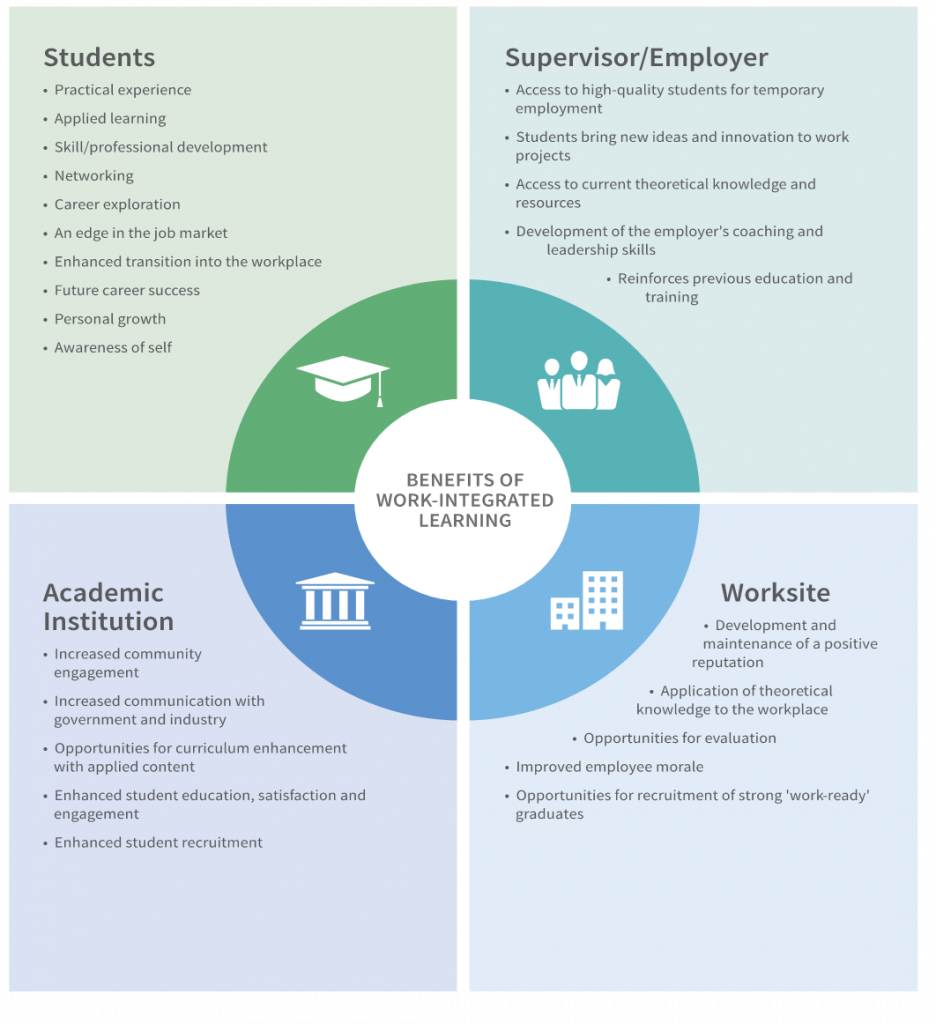5 Importance of Work Experiences in Post-Secondary Education
Experiential learning activities in general, and work experiences in particular, feature heavily in ASE ER programs and courses. There is ample evidence in support of work-integrated learning as a contributing factor in the successful transition to employment. This appears to be especially true for students with disabilities. Post-secondary education is recognized as a natural preparatory conduit to employment and community participation. Further, institutions reported “employability programs that teach soft skills” were “high impact.” [1] A recent study focused on students in a transition program for youth with Autism (Project Search Plus ASD Supports, or PS-ASD) demonstrated the importance of community-based work experiences. “In a follow-up study, Schall et al. (2015, as cited in Wehman et al., 2017) found that individuals who participated in PS-ASD required fewer hours of intervention to find a job than individuals in supported employment only. Additionally, individuals in PS-ASD had better job retention and earned a higher wage despite having lower educational attainment that individuals who received only supported employment services. This indicates that internships might provide advantages to the individual with intellectual and developmental disabilities beyond simply learning job skills.”
While work experiences are beneficial to all youth, they are particularly valuable for youth with disabilities. One of the most important findings from the research shows that work experiences for youth with disabilities during high school (paid or unpaid) helps them acquire jobs at higher wages after they graduate. Also, students who participate in occupational education and special education in integrated settings are more likely to be competitively employed than students who have not participated in such activities. (Blackorby & Wagner, 1996; Colley & Jamison, 1998; Luecking & Fabian, 2000; Rogan, 1997, as cited in National Collaborative on Workforce and Disability, 2004) National Collaborative on Workforce and Disability. (2004). Career planning begins with assessment: A guide for professionals serving youth with educational and career development challenges. Retrieved December 12, 2017, from National Collaborative on Workforce and Disability: http://www.ncwd-youth.info/career-planning-begins-with-assessment
Among the benefits of PSE work experience for students are
- The opportunity to explore jobs which helps students make choices and identify interests
- Learning more about what they like/dislike
- Learning about their abilities, talents and strengths
- Identifying working conditions suited to personal needs/preferences
- Learning and enhancing basic employability skills
- Increasing independence
- Learning specific work skills
- Learning about the role of work in life and society
- Having the opportunity to interact with peers and other adults in a variety of inclusive real work settings
- The opportunity to “sample” different types of work with no long-term commitment, or obligation
- The possibility of securing positive work references building a resume
- Expanding networks
“An internship allows a student with intellectual and developmental disabilities to be totally immersed in a workplace where high expectations are the norm. It allows an intern to work not only mastering work skills but also mastering social skills where strict business norms exist” (Daston et al., 2012, as cited in Wehman et al., 2017).
Participation in post-secondary education and work experience activities are evidence-based practices which support the transition to employment.
“Positive gains in employment and independent living have been reported for students with intellectual disability following post-secondary training. For example, Zaft et al. (2004, as cited in Wehman et al., 2017) reported that students with intellectual disability who participated in a PSE program were more likely to obtain competitive employment and need fewer job supports than a matched sample of students who did not participate in a PSE program.” [3]
Long Image Description
Figure 5.1 image description: Students will gain practical experience, supervisors have access to high quality students, academic institutions will increase their community engagement and worksites can develop and maintain a positive reputation. [Return to Figure 5.1]
- Johnston, N., & Sator, A. J. (2017, March). Experiential education, p. 4. Retrieved October 3 2017, from bccat.ca: www.bccat.ca/pubs/expeducation.pdf ↵
- British Columbia Ministry of Advanced Education. (n.d.). Adult special education. Retrieved October 2, 2017, from Government of British Columbia: http://www2.gov.bc.ca/gov/content/education-training/adult-education/adult-special-education ↵
- Wehman, P., Avelline, L., Brooke, V., Hinterlong, P., Inge, K., Lau, S., & McDonough, J. R. (2017). Transition to Employment. In M. Wehmeyer, & K. Shogren (Eds.), Handbook of research-based practices for educating students with intellectual disability (pp. 450-470). Routledge. ↵
- Jackson, D. (2015). Employability skill development in work-integrated learning: Barriers and best practice. Studies in Higher Education, 40(2), 350-367. https://doi.org/10.1080/03075079.2013.842221 ↵
- Higher Education Quality Council of Ontario. (n.d.). A practical guide for work-integrated learning, p. 15. Retrieved from Higher Education Quality Council of Ontario: http://www.heqco.ca/SiteCollectionDocuments/HEQCO_WIL_Guide_ENG_ACC.pdf ↵


